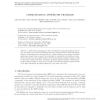Free Online Productivity Tools
i2Speak
i2Symbol
i2OCR
iTex2Img
iWeb2Print
iWeb2Shot
i2Type
iPdf2Split
iPdf2Merge
i2Bopomofo
i2Arabic
i2Style
i2Image
i2PDF
iLatex2Rtf
Sci2ools
125
click to vote
ICLP
2010
Springer
2010
Springer
Communicating Answer Set Programs
Answer set programming is a form of declarative programming that has proven very successful in succinctly formulating and solving complex problems. Although mechanisms for representing and reasoning with the combined answer set programs of multiple agents have already been proposed, the actual gain in expressivity when adding communication has not been thoroughly studied. We show that allowing simple programs to talk to each other results in the same expressivity as adding negation-as-failure. Furthermore, we show that the ability to focus on one program in a network of simple programs results in the same expressivity as adding disjunction in the head of the rules.
Related Content
| Added | 23 Aug 2010 |
| Updated | 23 Aug 2010 |
| Type | Conference |
| Year | 2010 |
| Where | ICLP |
| Authors | Kim Bauters, Jeroen Janssen, Steven Schockaert, Dirk Vermeir, Martine De Cock |
Comments (0)

